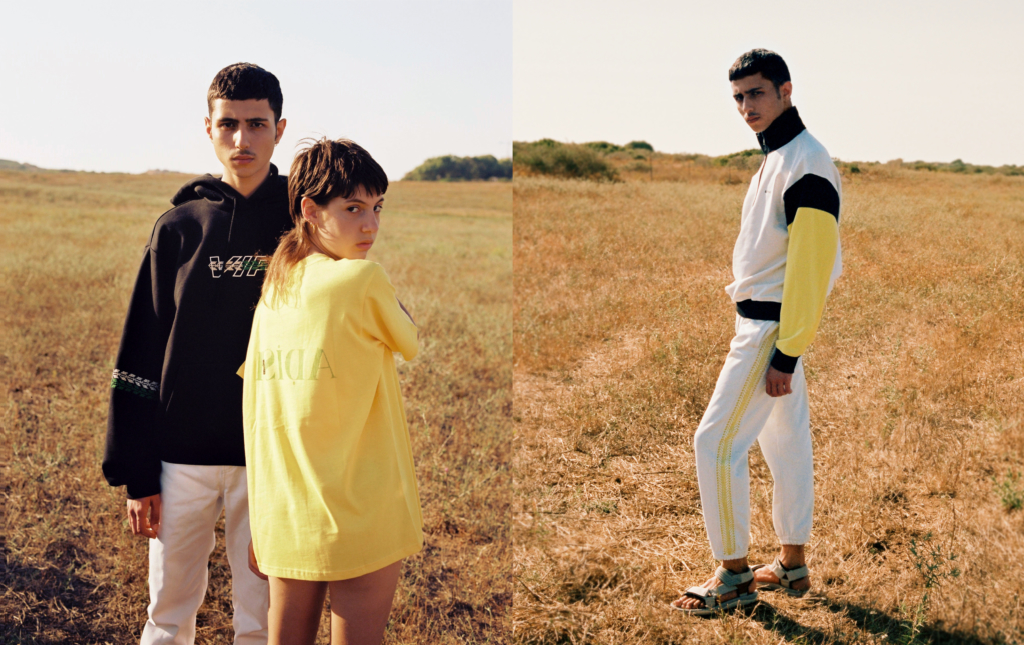Collection Survey: ADISH Explore The Freedoms And Non-Freedoms Of Palestinian Taxi Drivers
Real movement.

Amit Luzon and Eyal Eliyahu run their label ADISH out of Tel Aviv. You could simply say that what they do is streetwear, but it’d hugely miss the mark on what they’re involved in (and thinking about) while they piece together tracksuits, jackets and tees with ripping motifs. Inspired by Palestinian taxi drivers from the West Bank, their SS19 collection is at once a politically charged narrative and an ode to swaggy elders who may not know just how swaggy they are.
The collection title, Area A, refers to the part of the West Bank that is supposed to be administered by the Palestinian Authority. “A region that is surrounded by walls or heavily patrolled borders,” their press release reads. “Most of the people from ‘Area A’ cannot leave or enter without receiving permission from the Israeli government.”
The movement between areas, divided into A, B and C is limited. And so, ADISH think about the taxi drivers who, unless they’re born in the Israeli-controlled Area C, do not have total freedom of movement. And while the designers are turning to these drivers’ self-made uniforms for visual inspiration, the narrative is one that rings true for themselves too — the Israelis on the ADISH team can’t visit their Area A twin city Ramallah, but they work with Palestinians (roughly 50 women who create traditional embroidery for the garms) who can. Together, they’ve made a collection that “speaks to the dream of dialogue and exchange.”
Completely grabbed by their aesthetic and story-telling, we asked Amit and Eyal to fill out our legendary Collection Survey so we could find out just a little bit more…
Names: Amit Luzon and Eyal Eliyahu
Starsigns: Amit- Sagittarius, Eyal- Aquarius
Where are you from and where do you live now?
We were both born and currently live in Israel, in two neighboured cities in the centre of the country — Petah Tikva and Ramat Hasharon.
Any personal beliefs or values that are meaningful to your work?
We both embrace craft, and always decide on never going the easy route on anything, we also try to work with people who are different than us.
And what were you doing, learning or practicing before you started working on your line?
Neither of us had any formal training in fashion. Before we started ADISH, Eyal had been working as a store manager at a fashion boutique in his hometown, while I was working with my mother on her beauty business. We wanted to start something of our own, which reflected our interests.
Can you tell me a little bit of background on the collection and label — any inspirations, references, important collaborations?
When we started to work on ADISH, our first thoughts was to work with crafts in the Middle East and specifically in our region that no-one ever brings to the fashion scene in a contemporary way. Our first and most important collaboration is with the Palestinian ladies who are working with us and creating their traditional handmade embroidery on our garments. We met the the team through the Parents Circle Families Forum, a joint Palestinian-Israeli organisation committed to families who have lost loved ones during the Palestinian-Israeli conflict. We started with three ladies and now we are working with more than 50, which are divided into different teams for production and developing new patterns for the collections.
If you could describe the collection in five words?
No in and no out
If the collection was a colour: Green
If it was a mood: Ambitious
If it was an animal: Eagle
If it was a language: Hebrew with Arabic accent
If it was a place: Jaffa beach
If it was a time: 4am
If it was a song: YA WAD YA HELIWA by Haifa Wehbe
If it was a season: Always summer
If it was a food: Makluba
If it was a YouTube video:
If it was a smell: Sage
If it was a texture: Feather
If it was a quote: “Make a way out of no way”
If it was a film: Promises by B.Z Goldberg




















